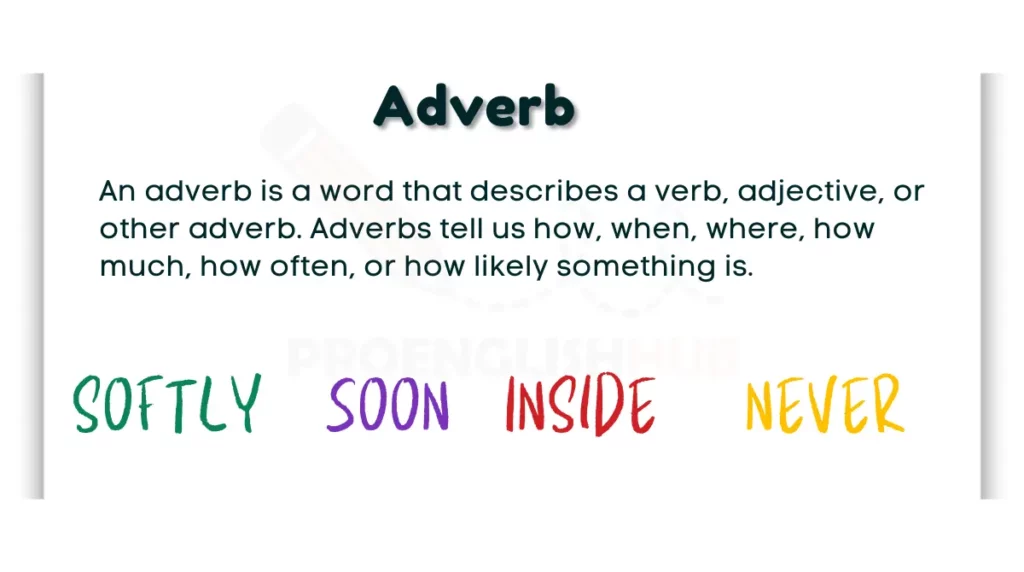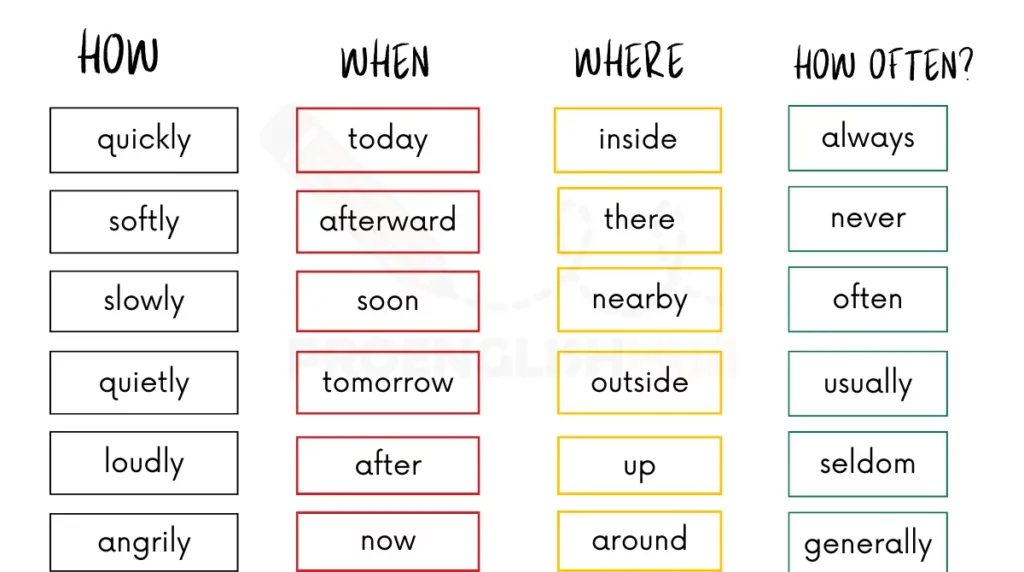Table of Contents
ToggleWhat is Adverb?
An adverb is a word that describes a verb, adjective, or other adverb. Adverbs tell us how, when, where, how much, how often, or how likely something is. They add more details to sentences.

Types of Adverbs
1: Adverbs of Manner
These adverbs tell us how something happens. They answer the question “how?”.
- Slowly
- Quietly
- Happily
Examples
- The kids played quietly in the yard.
- She sang happily in the choir.
- He drove the car slowly down the street.
2: Adverbs of Time
These adverbs tell us when something happens. They answer the question “when?”.
- Yesterday
- Tomorrow
- Soon

Examples
- We went to the park yesterday.
- I will see you tomorrow.
- The bus will be here soon.
3: Adverbs of Frequency
These adverbs tell us how often something happens. They answer the question “how often?”.
- Always
- Usually
- Never
Examples
- I always brush my teeth before bed.
- She usually gets good grades on tests.
- He never eats vegetables.
3: Adverbs of Degree
These adverbs describe the level or extent of something. They answer the question “to what extent?”.
- Very
- Quite
- Too
Examples
- My friend played very well in the game today.
- The assignment was quite difficult.
- I ate too much food at the party.
4: Conjunctive Adverbs
These adverbs connect clauses and sentences together. They clarify sequence or relation between ideas.
- However
- Likewise
- Therefore
Examples
- I was tired; however, I went to dance class anyway.
- She studied hard; likewise, she got an A on the test.
- He didn’t study much; therefore, he failed the exam.
5: Adverbs of Certainty
These adverbs describe how sure we are about something. They answer the question “how certain or unsure?”
- Certainly
- Probably
- Maybe
Examples
- She will certainly help us if we ask nicely.
- They probably won’t come to dinner tonight.
- Maybe we will go to the park later.
6: Adverbs of Place
These adverbs describe location and placement. They answer the question “where?”.
- Here
- There
- Outside
Examples
- Come here and look at this.
- She went there yesterday.
- The kids played outside in the backyard.
7: Adverbial Phrases
These are groups of words that function as an adverb. They provide more details in a sentence.
- In a hurry
- Without doubt
- After school
Examples
- He rushed to work in a hurry this morning.
- Without doubt, she is very talented.
- We play basketball after school on Fridays.
8: Adverbs of Purpose
These adverbs describe someone’s reason or intention for doing something.
- So: I studied hard so I could get a good grade.
- Therefore: She practiced every day, therefore she won the competition.
- Hence: We brought an umbrella hence it might rain.
Examples
- I studied hard so I could get a good grade.
- She practiced every day, therefore she won the competition.
- We brought an umbrella hence it might rain.
Usage in Sentences
- She works hard intentionally to save money for college.
- I packed extra clothes specifically for the camping trip this weekend.
- They offered discounts deliberately to attract more customers.
- She woke up early purposely so she could study before class.
- He ran swiftly so he would not miss the bus.
- I went to bed early deliberately because I was very tired.
- She sang loudly intentionally to get people’s attention.
- I turned down the TV volume carefully so my sister could study.
- They tip-toed quietly in order not to wake the baby up.
- He set his alarm intentionally to make sure he wakes up on time.
Adverbs Modifying Adverbs
When an adverb modifies another adverb, it provides additional details about the way the first adverb affects the word it modifies.
Examples
- Jenny rides her bike very often.
The adverb “very” tells how often Jenny rides her bike.
2. The movie tickets are almost completely sold out.
The adverb “almost” tells how completely the tickets are sold out.
Adverbs Modifying Adjectives
Adverbs can describe adjectives by telling how much the adjective describes the noun.
Examples
- Jenny is very happy with her bike.
The adverb “very” tells how happy Jenny is.
2. The movie tickets are completely sold out.
The adverb “completely” tells how sold out the tickets are.
Adverbs Modifying Verbs
Adverbs describe verbs by telling where, when, how, and how much the action happens.
Examples
- Jenny bought her bike here.
The adverb “here” tells where Jenny bought her bike.
2. She barely saved enough money.
The adverb “barely” tells how much she was able to save money.


